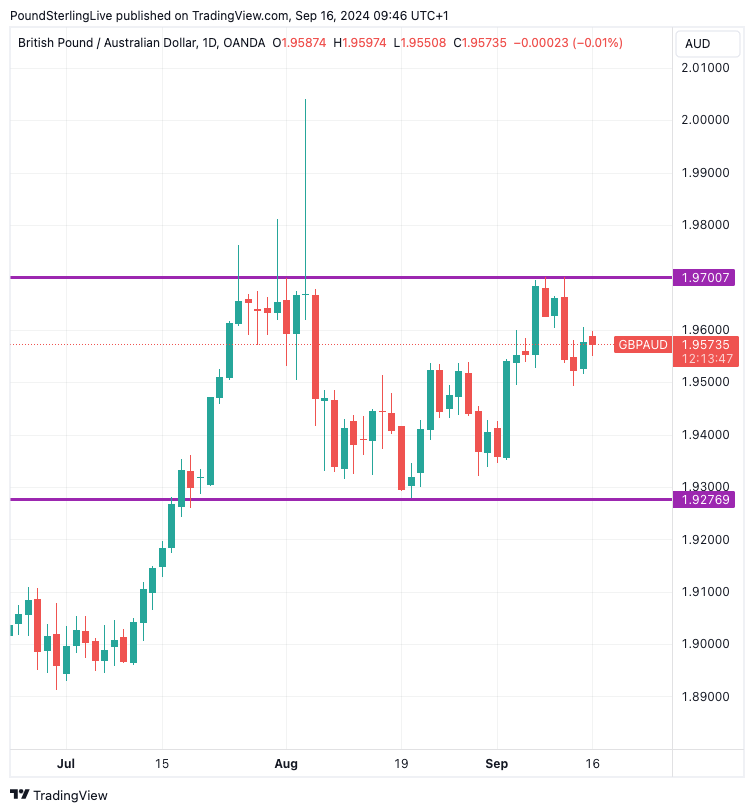
Image © Adobe Images
We forecast the Pound to struggle against the Australian Dollar in the week ahead owing to the strong likelihood that the Federal Reserve will cut interest rates by 50 basis points.
This would provide a strong boost to global investor sentiment, raising stocks and commodity prices and those currencies that are highly correlated with these two asset classes, namely the Aussie Dollar.
If the Fed does proceed with a 50bp cut, the Pound to Australian Dollar exchange rate (GBP/AUD) would initially fall to 1.95, which is last week's low, but could easily extend to the August low at 1.9276 over the coming weeks.
However, a steep decline is not our base case at the moment, and we think any weakness in GBP/AUD will be shallow, as per recent price action.
The odds of a 50bp cut from the Fed rose last week following a number of press reports alluding to such an outcome, with markets interpreting the reports as being leaks from the Fed, which thought the market was not adequately priced for such a move.
Yet, the Aussie Dollar didn't make too much headway against the Pound, and we actually saw GBP/AUD rise into the weekend.
This hints that the leaks were also supportive of Pound Sterling, and suggests GBP/AUD could remain supported, even in the event of a 50bp cut this week.
This is why we think GBP/AUD selloffs would be limited to the 50-day moving average, which is currently at 1.9451.
Should the Fed disappoint and cut rates by 25 basis points, the Pound would move higher against the Australian Dollar, raising the prospect that GBP/AUD reaches resistance at 1.97. We know this is a significant resistance point and we doubt it will be broken in the near term, requiring those buying Australian Dollars to be nimble.
It's a busy week in the UK, too, with Wednesday's inflation report and Thursday's Bank of England decision offering some domestic flavours that can offer two-way opportunities for those buying and selling Aussie Dollars.
Core CPI inflation is expected by the consensus to have risen from 0.0% to 0.4% month-on-month, taking the annual rate from 3.3% to 3.5%. Headline CPI is forecast to have jumped from -0.4% m/m to 0.3%, while the annual rate is expected to have remained at 2.2.%.
Any undershoot in the data would weigh on the Pound. But, survey data continues to show a resilient economy and there are no signs of massive disinflation taking hold. The Bank of England and institutional economists think inflation will inch up over the remainder of 2024, and this week's data should confirm this.
The Bank of England will acknowledge these inflation dynamics on Thursday by keeping interest rates unchanged at 5.0% and communicating that it will continue to watch the data when deciding on future interest rate cuts.
Because there is no Monetary Policy Report or press conference this week, markets will instead keep a close eye on the minutes from the meeting and the vote composition of the Monetary Policy Committee.
"The focus could be on the voting pattern among committee members. We are bracing for either an 8-1 or 7-2 vote, with ultra-dove Swati Dhingra to potentially be joined by Dave Ramsden in opting for an immediate rate reduction," says Matthew Ryan, Head of Market Strategy at Ebury.
"A closer vote, whereby we see more of a balance between the hawks and the doves, could trigger a sell-off in sterling, as markets ramp up bets in favour of cuts at a pace more frequent than one per quarter," explains Ryan.
The base case assumption amongst economists is that the vote will land at either 8-1 or 7-2, which, if correct, would underpin GBP/AUD.

